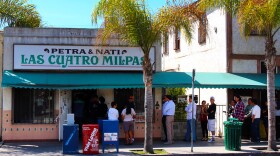The San Diego City Council is denouncing hate after a handful of anonymous public commenters repeatedly launched into antisemitic tirades at Monday's council meeting.
The disruptions highlight the downsides to opening council meetings to virtual, anonymous participation. The council has allowed public comment via phone or Zoom since the early months of the COVID-19 pandemic, and has since embraced the option as a way to make council meetings more accessible.
Nearly all the disruptive commenters used fake names, some of which called for violence against Jews or referenced figures in Nazi Germany or neo-Nazism. When they began to make antisemitic remarks, Council President Pro Tem Monica Montgomery Steppe directed them to speak about the topic at hand or else their microphone would be cut off.
University of San Diego law professor Miranda McGowan said that kind of regulation of speech is allowed under the First Amendment. While the Constitution protects almost any kind of speech from a public place like a park or sidewalk, she said, government meetings are considered "limited public forums" where free speech rights can be weighed against the government's need to get through their agenda.
"The City Council has to do its business," McGowan said. "Though the City Council can't shut people down because they think that they are expressing a viewpoint in an offensive way, they can limit people to talking about certain topics."
The council released a joint statement after Monday's meeting saying in part: "As one of the most diverse councils in San Diego's history, we speak in solidarity that there is no space for hate speech and violent misinformation in our city."
San Diego has seen a series of worrisome incidents of antisemitism in recent weeks. Antisemitic flyers were distributed this summer in Allied Gardens and Del Cerro, and in July a rabbi was assaulted at a convenience store near SDSU.
During Monday's meeting, Councilmember Jen Campbell suggested the council's Rules Committee consider a requirement that each remote public commenter share their place of permanent residence.
"I just find it hard to believe that here in San Diego we would have such hatred, such vitriol, against our fellow citizens," Campbell said.
McGowan said such a policy would not prevent a commenter from simply lying about their location. However she said the council could adopt other rules to limit a commenter's anonymity.
"It does seem completely unproblematic to me that the city could require someone to turn their camera on," McGowan said. "The City Council does not have to permit Zoom attendance at all."







